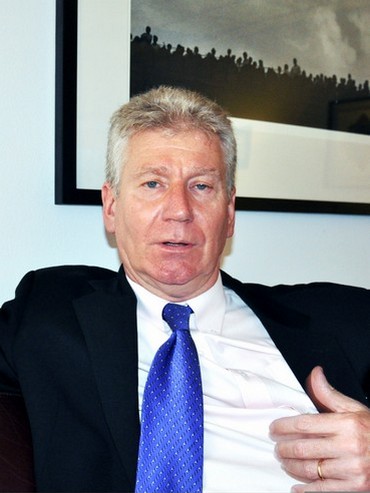 Stewart Beck, the Canadian high commissioner to India says the number of student visas to Indians will only increase in the next two years.
Stewart Beck, the Canadian high commissioner to India says the number of student visas to Indians will only increase in the next two years.
The increase in the number of Canadian student visas issued in India -- from 3,000 in 2008 to 12,000 in 2010 -- has made Stewart Beck, the Canadian high commissioner to India, very happy.
"This growth will continue. We are moving to 25,000 student visas in the next two years, as it is a big revenue generator for Canada," Beck said.
He believes 'the performance of the Canadian economy' played a role in this increase. "There's a safety of Canada as a destination for your children. You can do a four-year degree and stay on (to work) and even apply for citizenship (while you are in Canada, which was not allowed earlier)," he said "You can't do that in the United States. These are all positive things that generate interest. Our brand in India will truly be around education in the next three years, and Indian parents will see Canada as a great place to send their children to."
The high commission has also introduced a Business Express Program, which allows it to process applications from the 55 Indian companies that have joined the program "quickly and efficiently."
But all of this comes at a time when Canadian immigration officers in India have come under criticism for rejecting 80 percent of tourist visa applications in Chandigarh and about 50 per cent in New Delhi.
"Visa issue engages my attention, because it is the largest section we have in the high commission," Beck said, adding that India had Canada's largest immigration section.
"We have a dedicated, hard working group of people. They are dealing with temporary resident permits, skilled worker permits, permanent residents, students. You are talking about lot of applications that come to us."
Immigration attorneys in Canada are critical of the rejection of visitors' visas without detailed explanations. They say the letter has only three boxes, and invariably the box saying 'you have no attachment to your home country' is checked. This means the 'applicant is young, not married, has no substantial bank account or real estate in his/her name,' implying that the applicant has no stake in India and may not leave Canada.
Beck defended his staff, saying it was easier for the officials to tick mark that box for applications that haven't "got all the information. It is not like you have 45 minutes to go through each application to make sure that you forgot to put this here and there."
"All I can say to people is please fill out your application properly and provide all the information," he added. "I do know people here do a very thorough job and they are good at what they do. They process enormous amount of applications and they come up with procedures that allow them to do more with more success."










 © 2025
© 2025